Seen and Heard Interview
Towards the Edinburgh
Isolde: an in-depth interview with US soprano
Christine Brewer by David Harbin © July 2005
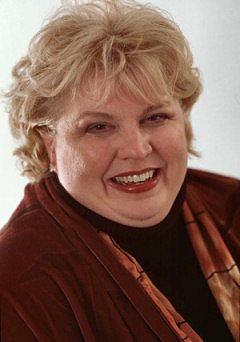
When Christine Brewer sang Isolde at the London Barbican Centre
in 2000 the world at last really started to take notice. The performances
of the three acts split over three nights, themselves spread over
several months, brought instant acclaim with critics hailing her
Isolde as the finest heard in the capital for over 40 years. “Christine
Brewer's Isolde remains among the most sheerly beautiful examples
of Wagner singing,” purred The Guardian. Michael
Tanner in the Spectator went further: “Not only
does she enter fully into this stupendous role, she has the voice
to do justice to her understanding, and for the first time in
years I was physically thrilled by the sound of a Wagnerian in
full cry, above all as she sang the curse on Tristan and wished
for death for them both. Almost no soprano I have heard has retained
such musicality under that duress. “
If few in the audience knew that - amazingly - this was the first
time Christine Brewer had sung a note of Isolde in public, no-one
could doubt they were witnessing one of the finest Wagnerian sopranos
today.
Ms Brewer's lustrous voice commands an amazing range of colours,
especially burnished metals. Her notes soar into the stratosphere
and she sings with a natural intelligence, her singing blessedly
steady and free from distracting mannerisms.
Edinburgh audiences will have the chance to hear for themselves
when Christine Brewer sings Isolde with Jonathan Nott and the
Bamburg Symphony at the 2005 International Festival on 30th August.
For this special occasion Ms Brewer kindly agreed to discuss the
journey towards singing her Edinburgh Isolde – her first
ever Wagner role complete within a single performance.
I decided to present Ms Brewer’s thoughtful
replies unedited. They are a treasure trove for Wagnerians and
lovers of great singing.
I understand a key event in your career
was when your husband suggested you did not renew your teaching
licence and focus on your singing instead. Can you please give
more details of this? Are there any other major turning points?
A couple of things were what I would call turning points in my
career. I have to give credit to Richard Gaddes for his good instincts.
He heard me sing in a little competition for young singers in
St. Louis. I didn't win a prize, but I saved his critique sheet
which said that he thought I was probably going to be a dramatic
soprano some day and just needed to be patient and keep working.
And a couple of days later, I received a check from him for the
amount that I would have won had I won the competition! And he
offered me a job singing in the chorus at the Opera Theatre of
St. Louis. This would have been in the early 80s.
Then in the late 80s after I'd been singing in the chorus and
doing small roles at the Opera Theatre and singing as a paid section
leader of the St. Louis Symphony Chorus, my husband (Ross Brewer)
did not renew my teacher's certificate as we always did at the
end of every summer. I had been substitute teaching for several
years after quitting teaching full time (Kindergarten - 12th grade
music in a coal mining town) I was a substitute teacher for several
school districts around our home town of Lebanon, Illinois --
I taught everything from band to 5th grade science to high school
mathematics to kindergarten. Ross thought that I was using the
teaching certificate as an insurance policy -- I would always
have employment if the singing career didn't work out. And he
was right -- I wasn't focusing 100% on the singing. But after
I realized that certificate wasn't renewed, I buckled down, as
my mom would say! I won the Met auditions in 1989, as well as
a Richard Tucker grant, and I got management with IMG Artists
in NYC (whom I am still with).
You decided to delay an international career until later
in life so that you could focus on your family and community.
What effect does starting later in life have on your voice technically
and on the roles you choose to sing? Would your first Isolde have
been much different if, say, you were in your mid thirties? There
seems to a trend for young singers from (often) Eastern Europe
tackling Wagner in their 30s or even 20s....
I won the Met auditions in 1989 at the age of 33 which was the
cut off age for women at that time. So I really was a late bloomer,
so to speak. However, for the dramatic singer, I don't think of
that as too late. I spent much of my late 20s and early to mid-30s
learning concert repertoire and singing with choral groups around
the St. Louis area. This is the time that I performed things like
Creation, Brahms’ Requiem, many Bach cantatas,
Mozart’s Requiem -- all the standard concert repertoire
that I am still singing today (well, not the Bach cantatas). I
spent those years studying and working on my technique while letting
my voice grow naturally. I spent some time working with Birgit
Nilsson, and she advised me to continue to sing Mozart as long
as I could to keep the voice youthful and healthy. I remember
in the early 90s, I did an audition tour around the UK and sang
for several conductors. (I think this was the start of my deep
connection with your country -- those auditions led to many jobs
that snowballed into many more opportunities in the UK) Anyway,
I remember one audition in particular with Franz Welser-Möst.
I sang some Mozart arias and then sang the Strauss Wiegenlied
for him. He gave me one of the nicest compliments I've ever received
-- he said that he wouldn't be so rude to ask my age, but after
hearing me, he could tell by the way I sang I was older than my
voice sounded! I've never forgotten that, and I think that all
the time I spent letting my voice develop naturally and not forcing
it, paid off in letting my voice sound healthy and youthful.
I do think had I tried to sing Isolde in my mid-30s instead of
my mid-40s, it would have been much different. I think not only
physically, but emotionally, I wasn't ready for Isolde in my 30s.
I can honestly say that when I first started working on it in
my mid-40s, I felt very comfortable with the role -- it felt very
natural to me and I never felt that I had to force my sound at
all. I will also say that during this time when I was starting
my career, I was also raising my only child, Elisabeth. I did
turn down things that would have taken me away from home for weeks
at a time if I couldn't take her with me. Now, looking back, I
don't think those things I turned down were as important as developing
the relationship that I have with my daughter who is now 21 years
old.
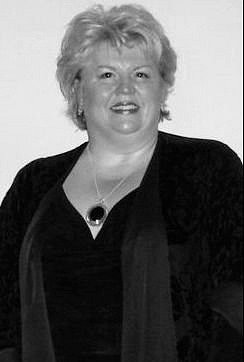
London critics hailed your 2000 Barbican
Isolde as the best heard in the capital for 40 years. Since then
you have also sung Isolde in Los Angeles with Salonen conducting.
What extra insights do you now feel you will bring to your third
Isolde at the 2005 Edinburgh Festival?
I have been happy taking this Wagner journey these past few years.
My managers asked me several years ago where I saw myself down
the line in 10 or 15 years, and how would I like to get there.
I said at the time that I knew I would be singing Wagner, and
that I would ideally like to do so in concert settings with great
conductors and orchestras. I couldn't have been more fortunate
than to have done my first Brünnhilde (Act III - Die
Walküre) with Donald Runnicles and the BBC Symphony
Orchestra and also my first Isolde with the same team! Donald
asked me when we were first working on Die Walküre
if I liked singing this rep and I said I LOVED singing it! He
said that was good, because he felt that I was born to sing it.
It just feels right not only in my voice, but in my bones when
I'm singing his music.
It will be wonderful for me to sing Isolde all in one night at
the Edinburgh Festival. This journey I've taken with the three
acts separated by several weeks the first time in London and then
in LA this past season with Esa-Pekka in three consecutive nights
has given me the confidence to do the whole thing in one night.
I have to say that both in London and in Los Angeles, I felt after
the first act I could have gone right on and sung the rest of
the opera. My blood was pumping, and the adrenaline was flowing
-- I could have gone on! So I'm really excited to have that opportunity
in August in Edinburgh.
And, of course, I've grown with the role, as you do with anything
that you sing more than once or twice. There are bits of the text
that jump out at me in a different way. I know where the moments
are that I need to pace myself vocally and emotionally. Each opportunity
I have to sing the piece will help me enrich the role. And it
is also very interesting to work on the role with different conductors
and get different perspectives. I first met Jonathan Nott at the
Edinburgh Festival a couple of years ago when we performed the
Wesendonck Lieder with his Bamberg Orchestra. That was
the first time I had sung those pieces with orchestra, and it
was such a lovely experience. We really hit it off, and that's
when the idea of the Tristan and Isolde came about. So
I'm really looking forward to spending some time with him on the
role this summer.
Kirsten Flagstad said she did not understand the meaning
of Tristan und Isolde. Have you any thoughts about what Wagner
was ultimately saying?
It is interesting to think about what Wagner is saying in Tristan
und Isolde. I've been reading a very good book called Blink
about how we often make decisions or do things in our lives that
we really can't explain. And quite often when we try to explain
them, we are all wrong. Sometimes I think singing is a bit like
that for me. When I have to pinpoint how or why I do something
or make an artistic choice, I think it comes from somewhere so
deep in my subconscious mind that I really can't explain how it
happened. But I will say that I have done with the role of Isolde
what I've done with every role I sing. I spend hours just reading
the text over and over -- in the German and then in my literal
translation into English. I do this many times before I ever try
to put the music to it. And I don't attempt to sing the role until
something about the character speaks to me in a personal way.
Until I feel some understanding about the vulnerabilities of the
character, I won't put the music to the text. After I have completed
this process, I feel that the character has a little bit of me
in it. I find the strengths and weaknesses in the character that
are part of me.
In Isolde, I find the first act so interesting because I get to
show an intelligent, witty, angry, womanly, high-spirited person.
That first act can't all be about the anger for many reasons --
one is that it just couldn't be sustained vocally and mostly because
it would be so uninteresting! I try in every role I sing to find
the moments when I can show major contrasts. I mean, that's what
we are all about as human beings, isn't it? It's all about the
contrasts in our characters that make us interesting. And the
same is true with finding the characters in these operas. So I
won't say that I totally understand the meaning of Tristan
und Isolde or that I totally understand the character of
Isolde. But I will say that the role is changing with me as I
grow and change and have more life experiences.
My voice teacher, Christine Armistead (Washington University -
St. Louis, Missouri) always advises me to sing everything with
the voice and the life experience I have today. That has been
such good advice as I've ventured into this bigger repertoire.
I think it would be easy to become overwhelmed and want to jump
in head first. But to come to these roles with the voice I have
today has given me permission to explore them in a very lyric
way, because I still consider myself a lyric soprano. I just happen
to have a big voice, but it is still a lyric instrument.
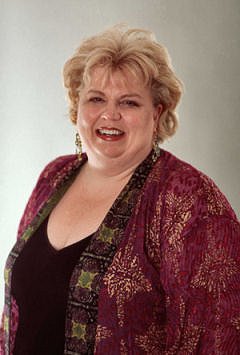
You sing a wide range of roles including Isolde, Elizabeth
I (Gloriana), Leonora (Fidelio), the Countess (Marriage of Figaro)
and Chysothemis (Elektra). In terms of character and technique
are there common threads?
The common threads in singing roles like Isolde, Elizabeth I (Gloriana),
Leonora (Fidelio), etc. is what I talked about earlier.
I find the vulnerabilities in these women -- I try to find what
makes them take risks, and then I take those risks. I find the
most compelling performances that I've ever seen have been when
singers or actors are willing to take risks and are willing to
really show vulnerability. That is so exciting to me! And I think
the best singers and actors never become bigger than their art
form -- my greatest desire is that the audience will feel that
they've actually seen a glimmer of Queen Elizabeth or Isolde or
Leonora and not that they've seen Christine Brewer "acting"
as those women. My husband told me that when he saw Gloriana
this spring in St. Louis, he forgot sometimes that I was singing
the role -- that was a great compliment.
How do your prepare before you go on
stage technically and in terms of character? Like many singers,
do you avoid bananas and chocolate? Flagstad drank a pint of stout!
On days of opera performances, I do have a pretty
boring routine. I get up pretty early in the morning, around 7:00
or so and sort of do something like take a walk or do some housework
-- just something to kind of get myself going. I have a nice breakfast,
maybe sing a little. And then I'll look through the score, mostly
just reading the text aloud, maybe singing a passage or two along
the way. And then I always take a nap. I probably don't have the
proper body clock for this career. I would normally be in bed
by 10:00 p.m. So I have to force myself to take a nap in the early
afternoon on days of opera performances. I will then get up and
have something to eat like a chicken breast and salad and of course,
I'm drinking lots of water all day. I'm not a coffee drinker and
really don't drink a lot of tea either. I mostly just drink water
and have some fruit which I take to the theatre to have during
intermission. For concert performances, my routine is about the
same, but not quite as rigid -- it just depends on the piece.
For a Verdi Requiem or Beethoven Missa Solemnis,
I really have to be rested and in top form. For a Mozart Requiem
or Beethoven 9, I could maybe do a little shopping or even lunch
with a friend. I usually don't do much visiting or chatting on
a day of a performance.
What singers have influenced you in live
performance or recordings? I understand you once saw Eileen Farrell
sing The Immolation scene.
There are so many singers who have influenced
me. I would say first and foremost would be my mother. She had
the most beautiful voice I've ever heard. She wasn't a trained
singer, but everyone in her family sang and beautiful voices.
Some of my fondest memories from my childhood were when we were
together for wakes or weddings or holidays and someone would get
out a guitar or harmonica and we would just sing into the night!
I grew up on gospel and bluegrass music. My brothers and mom and
I sang gospel music at church, and my mom sang in a women's trio
performing gospel and jazz. So I grew up in a family that was
very musical. I started singing at church at the age of 3, so
performing has never been unnatural to me. Not to say that I don't
ever get nervous, but I do love to perform!
I've listened to all kinds of singers in my life. I did hear Eileen
Farrell sing the Immolation Scene with the St. Louis Symphony
when I was a college student. I was sitting way up in the balcony,
and I was amazed at how her sound just soared over the orchestra.
What a voice she had! And I loved the way she just stood there
and delivered. There was no fuss or anything -- just a solid column
of sound.
I've also admired a variety of singers in the jazz and pop field
like Ella Fitzgerald and Dolly Parton. I know that will probably
surprise some people, but I listen to the way those women use
the texts and express and communicate a story, and that is what
it is all about. It really doesn't matter what kind of music you
are singing -- it's all about communicating the text to the audience.
I loved the way Leontyne Price's voice would just envelope me
like velvet. I never heard her perform live, but have loved her
recordings -- especially her recitals. I also have loved Janet
Baker's singing. I first fell in love with Strauss' ‘Wiegenlied’
when I heard a recording of her singing it when I was a student.
And I had the opportunity to hear her sing a recital in St. Louis
when I was a student. I loved the way each song was like a miniature
story -- she told the stories so beautifully.
For anyone who has not heard Christine Brewer, what CD
should they try first?
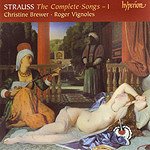
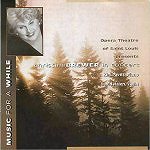
It's hard to say what CDs of mine people should hear first. I
am very happy with the new Strauss lieder recording I did with
Roger Vignoles for Hyperion. We did some of my favorite songs
like ‘Wiegenlied’, ‘Befreit’ and ‘Allerseelen’,
and then we did some very challenging ones like the ‘Gesange
des Orients’. It was a project full of love and commitment
-- I have developed a wonderful relationship with Roger over the
years of our working together, and we had a great time doing that
recording.
But I also like the recording I made in St. Louis a few years
ago with Kirt Pavitt accompanying -- "Music for a while."
It is a recording of pieces from the British Isles. I particularly
love this music like the ‘Salley Gardens’, ‘Ye
Banks and Braes’ and ‘Danny Boy’. I think I
have a special place in my heart for these songs, because most
of my family is from England or Ireland. Those songs really pull
at your heart strings.
Chandos have just released a set of you
singing in Fidelio and you are to sing the role of Leonora with
Sir Colin Davis and the LSO. What are the pitfalls and hurdles
of learning the same opera in two languages for performances so
close together? What are your views on singing opera in translation?
I have recorded Fidelio in English for
Chandos, and that was a wonderful experience. I had sung the role
many times in German before, so it wasn't too difficult to do
it in English. I find that the German operas seem to translate
into English pretty well. The rhythms of the language are pretty
similar, so it's not too difficult. I am happy, though, that I'll
also be able to record the role in the original language.
[the Chandos Fidelio is reviewed in the August 2005 Gramophone.
Alan Blyth says that Christine Brewer is the equal of her contemporaries
in the role of Leonora and in warmth of tone and technical security
surpasses them – DH]
What is the most important lesson you have learned over
your years of singing that you would give to someone wanting to
start a singing career?
I've learned so many important lessons in my years of singing
-- it's hard to say what is the most important one. I think I
would have to say that it is to trust my gut instincts. I go back
to that book I mentioned earlier, Blink. The author (Gladwell)
says that some of our best decisions are the ones we make in the
blink of an eye using our gut instincts. I think as we study singing
and work with good teachers and coaches, we begin to have a feel
for what is right and what isn't. There are certain roles that
I know I will never sing -- it seems that the big Italian repertoire
doesn't speak to me in the way that the German repertoire does,
or the way the Britten roles do, for instance. And I have trusted
those instincts, and I think so far this has been a good thing.
I also think that I've learned how important it is to have good
teachers, coaches and conductors to listen to and learn from.
I have coaches all around the world with whom I work whenever
I have a chance. This has been invaluable to me. As I quite often
say, "It takes a village to teach me how to sing!"
David Harbin © July 2005
For more information on Christine Brewer, including future schedule
and discography see www.christinebrewer.com
Details of Christine Brewer’s Strauss lieder CD on Hyperion
can be found at www.hyperion-records.co.uk
A review of the BBC Tristan done in 2002/2003 can be
read here
A review of Tristan und Isolde from the 2005 Edinburgh
Festival will appear on Musicweb on 1st September.
Pictures courtesy of Askonas Holt.







